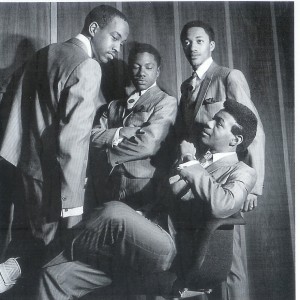 When you think of Stax Records, you don’t normally associate the company with doo-wop. At least I don’t. Instead we think of southern soul as presented by artists like Otis Redding, Eddie Floyd, and Sam & Dave, and later the deep funk of Isaac Hayes. But early on, there was indeed doo-wop music on the label.
When you think of Stax Records, you don’t normally associate the company with doo-wop. At least I don’t. Instead we think of southern soul as presented by artists like Otis Redding, Eddie Floyd, and Sam & Dave, and later the deep funk of Isaac Hayes. But early on, there was indeed doo-wop music on the label.
Like many of the best Stax artists, the Mad Lads came from Memphis. John Gary Williams, William Brown, Julius Green, and Robert Phillips attended that city’s Booker T. Washington High School, and in the early ’60s they formed a vocal group called the Emeralds. It wasn’t long before the young group captured the attention of Stax/Volt Records. Deanie Parker was the Director of Publicity for the company, and she made changing the name of the group a priority.
”We were practical jokers,” John Gary recalled. ”We played a lot of jokes around the company. If a telephone would ring, one of us might come out of a briefcase with a receiver-stuff like that. And Deanie said, You guys are mad. Y’all should be the Mad Lads instead of the Emeralds.’”
Their first single was “Sidewalk Surf,” which was released on the Stax label in 1964. It stiffed at the time but it’s one of those records that you would need a bank loan to buy today, if you could even find an original copy. The following year brought success however. The group’s beautiful harmonies blended perfectly with the soulful sound of the Stax house band on “Don’t Have to Shop Around,” and the single, this time on the Volt label, was a hit.
“Don’t Have to Shop” around was written by bass player Allen A. Jones, sax player Wayne Love (co-founder of the Memphis Horns), and Richard Shann. The record was produced by Charles Axton, a sax player who was a co-founder of the Mar-Keys in the late ’50s. “Don’t Have to Shop Around” raced up the R&B chart to #11, and even managed to edge into the Top 100 on the pop chart. An interesting note is that the record’s B-side, “Tear-Maker,” was an early co-write by Isaac Hayes.
The Mad Lads weren’t done with the charts though. Hits like ”I Want Someone,” ”I Want a Girl,” ”Patch My Heart,” ”Whatever Hurts You,” ”So Nice,” and ”By the Time I Get to Phoenix” followed over the next few years.
It was the time of the Vietnam War, and both John Gary Williams and William Brown were called to service. The Mad Lads soldiered on however. In 1969, Julius Green left the group and he was replaced by Freddie Rogan. After the Army, Williams returned, but he left again in 1972 to pursue a solo career. The group’s other Williams, Richard, formed his own group called Everyday People.
Julius Green asked for and got John Gary Williams’ approval to start a new group of Mad Lads. In 1974 they recorded one album for Stax, but it was never released because by then Stax was deep in the company’s well-chronicled financial troubles. The demise of Stax hit everyone involved hard. John Gary Williams left Memphis and found work in a packing plant in Iowa, then as a cabdriver in LA. Everyday People broke up.
“It was a dry spell,” John Gary said. “We always hoped that Stax would come back. That was my contention — I’m gonna stay in shape, write some songs, and when the company opens back up, we can get down again. That was the lowest point in my life.”
People still wanted to hear the Mad Lads though, and in 1984 Richard Williams complied with the demand by presenting a new group of Mad Lads. The following year they released a single called “You Blew It” on Express Records. Before too long, John Gary Williams rejoined the group. He got his wish when Fantasy Records acquired the Stax/Volt catalog and reactivated the Volt label. After releasing albums by the Dramatics, and the Spinners, it was time for a new Mad Lads album. Madder Than Ever was released in 1990, and it was the first Mad Lads album for the Volt label in more than 15 years.
”I feel blessed to be back on Volt again — the original label,” John Gary Williams said at the time.






Comments